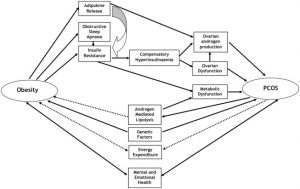What is PCOS?
Polycystic Ovarian Syndrome (PCOS) is a condition in which the ovaries produces excessive amounts of androgens, the male sex hormone. Excess of the male sex hormone in women disrupts the fr agile balance that is maintained between estrogen, progesterone, and the androgens. This hormonal imbalance often results in the development of cysts within the ovaries, contributing to irregular menstrual cycles, infertility, and anxiety/depression. Additionally, overproduction of these androgens leads to excess hair all over the body, acne, and insulin resistance and obesity.
agile balance that is maintained between estrogen, progesterone, and the androgens. This hormonal imbalance often results in the development of cysts within the ovaries, contributing to irregular menstrual cycles, infertility, and anxiety/depression. Additionally, overproduction of these androgens leads to excess hair all over the body, acne, and insulin resistance and obesity.
Studies have concluded that women affected by obesity have a greater risk for PCOS and women diagnosed with PCOS have an increased risk for obesity.
Obesity as Risk Factor for PCOS
The majority of women with PCOS are obese or overweight and/or have insulin resistance (50-90%). Resistance to insulin is a primary driving factor for obesity and type 2 diabetes, as insulin is a key regulator in maintaining normal blood sugar levels. An emerging theory of the cause of insulin resistance can be seen in studies of the hypothalamus, a structure of the brain responsible for regulating appetite, hormone release, and many other key metabolic roles. When there is inflammation occurring in the hypothalamus, however, there is disruption to many of these metabolic pathways that are vital for normal insulin signaling. This inflammation within the hypothalamus is prompted by a high-fat diet, further emphasizing the importance of a healthy diet in the maintenance of effective peripheral and neurological functioning.
Insulin resistance in peripheral tissues was actually found to enhance steroidogenesis in the ovaries, leading to higher production and consequent levels of androgens. This feature results in the hormone imbalance that contributes to many of the symptoms of PCOS.
PCOS as Risk Factor for Obesity
On the other side of the paradox, elevated androgen levelsin women with PCOS have been shown to impair insulin signaling, contributing to insulin resistance. As demonstrated above, insulin resistance promotes androgen production. As androgen elevations promote insulin resistance, the positive feedback mechanism present between PCOS and obesity can clearly be seen.
As indicated in the figure, there are a number of additional overlapping factors that perpetuate this sort of positive feedback mechanism that can be found between PCOS and obesity within patients.
Clinical Implications
Since PCOS and obesity undoubtedly compound the effects of the other, it is necessary to develop novel, effective treatments that will target both conditions. A strategy that has been used for a while to combat PCOS symptoms and infertility is hormonal oral contraception. This form of contraception provides supplemental estrogen and progesterone, thereby attempting to restore hormonal balance and allow for normal ovarian function. Additionally, antiandrogens have been reported to be effective in both lowering androgen levels improving insulin sensitivity. These drug strategies hold great potential for effective treatment of those who struggle with both PCOS and obesity.
Promotion of exercise and a healthy diet in those with PCOS is important in the clinical setting, as these strategies help to both undermine the severity of PCOS symptoms and combat the effects of obesity. However, this feat is easier said than done, as many women with PCOS also struggle with anxiety or depression that may hinder efforts to stay active and eat well.
It is ultimately necessary to increase research about PCOS and obesity so that more effective treatments emerge in the hopes of minimizing the difficulties that each condition brings about.
